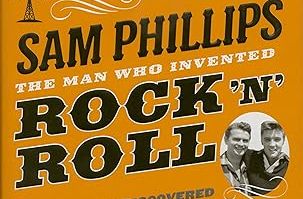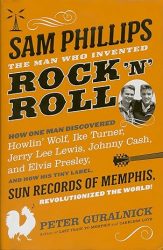
Sam Phillips was a single-minded visionary who some say invented rock ‘n’ roll.
“If I could find a white man who had the Negro sound and the Negro feel, I could make a million dollars!” This is the one remark anyone who either knew or knew of Sun Records pioneer Sam Phillips would recognize as Sam being Sam.
 In today’s overheated racial climate, Phillips would have been castigated, called a racist and forced to undergo CRT training. His tiny Sun Records label might never have played a major part in the birth of rock ‘n’ roll. Whether or not Elvis Presley, Howlin’ Wolf, Johnny Cash and other musicians would have made it as big or at all without Sun Records is an unanswerable question.
In today’s overheated racial climate, Phillips would have been castigated, called a racist and forced to undergo CRT training. His tiny Sun Records label might never have played a major part in the birth of rock ‘n’ roll. Whether or not Elvis Presley, Howlin’ Wolf, Johnny Cash and other musicians would have made it as big or at all without Sun Records is an unanswerable question.
Memphis in the 1950s was still a segregated city on the banks of the Mississippi River where cotton boats were loaded by slaves during the Civil War era. Boss Crump, the former Democrat mayor, and his organization ruled the city, keeping blacks in one sector. Beale Street downtown was live with music as it had been for years, and this was where segregation first began to crumble.
Phillips was born in 1923 in a tiny Alabama town near Muscle Shoals to parents who were barely above the poverty line. His family rented a small plot of land bordering a large farm where he heard the music black sharecroppers would sing while working the fields. Gospel music rang out in the Baptist church. Young Sam loved listening to the Grand Ol’ Opry on the radio. One time, his brother took him to Memphis and right then and there he began planning to go back one day.
He worked various jobs delivering bread, clerk at a candy shop, and as a deejay, was married, and not long after, the couple packed up and moved to Memphis. The call of Beale Street had been heard as far as Alabama. “I was 16 years old. We drove down Beale Street in the middle of the night and it was rockin'”
“My conviction was that the world was missing out on not having heard what I had heard as a child. I mean, going out and hearing a black man pick a guitar and pat a wood box under his foot as he sings. These were elements that I knew were not going away. And all of these elements resonated for, I would say, maybe a year and a half, and I wouldn’t let myself think about it.”
But he did think about it … a lot, until that became his obsession. “I’ve just got to open me a little recording studio, where I can at least experiment with this overlooked humanity. I don’t have any money, but I know I can build it with my own hands. I couldn’t not do it, not attempt to do it. Had I not tried, I would have been the biggest damn coward that God ever put on this earth. I was so committed in my mind, not to be a damn crusader, I guess explorer is a better word. I said, I’ve got to have this little laboratory, I got to have it, absolutely, I’ve gotta have it!”
That obsession manifested a studio in a rented storefront on Union Avenue in 1952. The sign for the Memphis Recording Service hung in plain view and underneath stated, “We Record Anything Anywhere Anytime.” People could walk in and record a song or personal message for a special someone. Some of those walk-ins were musicians, another a teenager named Elvis Presley who wanted to make a ballad for his mother. Howlin’ Wolf was another who recorded messages in the few hours Phillips kept the studio open while he wasn’t working as a deejay to put food on the table.
With little to no money in his pocket, Phillips started his own label, Sun Records. The label’s first release was by a local R&B musician named Johnny London, who had come in earlier to record, that’s right, his personal message to a girlfriend. London played sax but didn’t sing and neither did the other sax player he brought with him, but Phillips was determined to record them. The result was pretty rough, sounding like it had been recorded in a coal mine with echoes and tapping heard over the squawks of the two horns. The song was titled ‘Drivin’ Slow,’ and you won’t find it on Spotify. Phillips was frustrated because he couldn’t drum up much interest in the record or, for that matter, others he tried unsuccessfully to promote. That included one by the great blues guitarist B.B. King, formerly a deejay known as “the singing black boy.” One day B.B. suggested Phillips look up Ike Turner, who was a bandleader in Mississippi. Turner and his band showed up with a broken amp that popped and crackled like old vinyl records. Didn’t matter. The session produced the song ‘Rocket 88,’ and to the amazement of everyone, Ike Turner & The Kings of Rhythm’s single went to #1 on Billboard’s R&B chart.
Unfortunately, revenue from having a hit R&B song paled in comparison to what some of the Nashville country musicians were raking in for their labels. This is where the “find a white man with the negro sound” line came in, and in 1954 Phillips’ prayers were answered when this young trucker, a shy white boy with long sideburns and greasy hair opened the door on 706 Union Avenue. “He tried not to show it,” Phillips said, “but he felt so inferior. He reminded me of a black man in a way; his insecurity was so markedly like that of a black person.”
After several failed attempts to get the right sound, Phillips eventually brought in Scotty Moore and Bill Black (guitar and bass) to back Elvis on an Arthur Crudup song called ‘That’s All Right.’ The formula was to put a blues song on one side of a single and a country song on the other. And did it ever click. Elvis shot up the charts while other white singers came knocking on Phillips’ door: Johnny Cash, Carl Perkins, Jerry Lee Lewis, Roy Orbison, Charlie Rich, a veritable Hall of Fame roster. Four of them became known as the “Million Dollar Quartet” (Cash, Jerry Lee, Perkins and Elvis). Perkins’ ‘Blue Suede Shoes’ became a monster crossover hit. As Perkins later remarked years later, “The man had a knack for spotting raw talent.”
Phillips was able to impart what a young singer needed to hear by an offhand remark that got his point across. For instance, Cash wanted to be a gospel singer. Hearing this, Phillips told him, “Johnny, go sin a little bit, come back and sing me some songs.” You wonder if he also recommended Cash become the man in black.
In the latter third of the book, Guralnick tends to characterize Phillips as someone who stood for racial equality. He recorded black singers first but pretty much stopped after finding success with Elvis and the others. Phillips wasn’t the John Brown of rock. So what? He was an innovator in the world of music and wasn’t a racist. That should be enough.
“When I first formed my label,” he says, “the input I got from the distributors, jukebox operators, and retailers was that white teenagers were picking up on the feel of the black music.” These teenagers, however, weren’t satisfied with white singers covering black records. Phillips understood they wanted a combination of the two, meaning the white man who could sing with the mannerisms of a black man. He discovered and shaped them, “unlocking that person” is how he put it.
Guralnick goes into great detail in the latter third of the book about Phillips being an imperfect, complicated man, one who fought battles with alcoholism, mental illness (having electro-shock therapy), chronic infidelity, obsessive-compulsive behavior. That part could have been easily been reduced by half, and readers would not be tempted to skim through to the end. Yes, Sam Phillips was complicated but also passionate, especially when it came to making music and possibly, depending upon who you ask, inventing rock ‘n’ roll.
This book is a valuable account of one of the most important times in the history of popular music. Don’t look at this book as a page-turner, however, as there are 800 to turn, so dense with anecdotes and information that you may consider having a yellow highlighter nearby.


